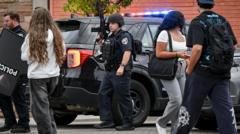Are Students Prepared for the Surge in Swatting Hoaxes? FBI Urges Vigilance!

Published: 2025-08-27 02:07:08 | Category: wales
The FBI is currently investigating a concerning trend of active shooter hoaxes, known as "swatting," at universities across the United States. This alarming wave of false reports has caused chaos and panic among students, faculty, and parents as they return for the new semester. Swatting involves making prank calls to emergency services, prompting armed police responses, and has reportedly increased in frequency and severity.
Last updated: 21 October 2023 (BST)
Key Takeaways
- Nearly a dozen universities in the US have experienced swatting hoaxes recently.
- Swatting is a prank call that leads to heavy police response, often involving armed units.
- The FBI has established a database to track these incidents more effectively.
- False reports can drain police resources and pose serious risks to public safety.
- Several individuals have been prosecuted for participating in swatting incidents.
Understanding Swatting: A Growing Concern
Swatting, the act of falsely reporting emergencies to elicit a large police response, has surged in recent years, particularly in educational settings. The FBI has called attention to this trend, emphasising the risks and consequences associated with such hoaxes. This increase is troubling, especially as it coincides with the return to campus for many students, leading to heightened anxiety and fear.
What Is Swatting?
Swatting involves making a false report to emergency services, claiming an active shooter or other serious threat exists. This leads to the deployment of a SWAT team, armed officers, and other emergency responders. The intention behind swatting is often to create chaos and fear, but the repercussions can be severe, including wasted police resources and potential harm to innocent individuals.
Recent Incidents Across US Universities
In just a few days, multiple universities have reported swatting incidents, including:
- Villanova University, Pennsylvania
- University of Tennessee at Chattanooga
- Iowa State University
- University of Arkansas, Fayetteville
- Northern Arizona University
- University of South Carolina
- Doane University
- University of New Hampshire
- University of Colorado Boulder
- Kansas State University
These incidents have led to panic and distress among students, as illustrated by the experiences of those caught in the chaos. For instance, at Villanova, student Ava Petrosky described a moment of sheer terror when she and others fled during a hoax. Similarly, Luke Robbins from the University of Tennessee recounted the frantic evacuation of his classroom as armed police responded to the threat.
The Impact of Swatting on Public Safety
Swatting not only causes panic but also drains valuable law enforcement resources. Each false report can cost thousands of pounds in response efforts and can lead to tragic outcomes. For instance, there have been instances where police, responding to swatting calls, have accidentally harmed innocent individuals. In one notable case, a British man was charged after a swatting incident led to police firing plastic bullets during a fake hostage situation in Maryland.
The FBI's Response to Swatting Incidents
The FBI has acknowledged the spike in swatting events and is actively working with local law enforcement to address it. They have created a database to track these incidents, which has recorded thousands of cases. The agency encourages the public to remain vigilant and report any suspicious activity immediately.
Who Is Behind These Hoaxes?
Several individuals have been prosecuted for swatting-related activities. These include a man extradited from Romania and a 19-year-old American-Israeli teen who was sentenced for making threats against Jewish institutions worldwide. Such prosecutions highlight the seriousness with which authorities are treating these hoaxes.
What Can Be Done to Prevent Swatting?
Prevention efforts must involve collaboration between law enforcement, educational institutions, and the public. Here are some strategies that can help minimize the risk of swatting incidents:
- Increased Awareness: Education on the dangers and consequences of swatting can deter individuals from engaging in this behaviour.
- Emergency Preparedness: Universities should have clear protocols for responding to threats, ensuring that students and staff know how to react in emergencies.
- Reporting Systems: Encouraging the reporting of suspicious activity can help authorities respond swiftly to potential threats.
- Collaboration with Law Enforcement: Institutions should work closely with police to develop strategies for handling swatting incidents effectively.
Conclusion
The rise of swatting hoaxes presents a complex challenge for universities and law enforcement agencies across the United States. As students return to campus, the risk of such incidents may create an atmosphere of fear and uncertainty. It is crucial for everyone in the community to remain vigilant and informed about the implications of swatting and to take proactive steps to ensure safety.
As this situation continues to evolve, it poses an important question for the future: how can we balance the right to safety and security on campuses with the need for responsible communication? The answers may shape how universities approach safety in the years to come. #Swatting #CampusSafety #FBI
FAQs
What is swatting?
Swatting is the act of making a false emergency report to provoke a large police response, often involving armed units. It can lead to panic and dangerous situations for innocent individuals.
How can universities prevent swatting incidents?
Universities can prevent swatting by educating the community about its dangers, enhancing emergency preparedness, and encouraging the reporting of suspicious activities to law enforcement.
What are the consequences of swatting?
Swatting can result in significant legal consequences for those involved, including prison time, and can also drain police resources and create unsafe situations for the public.
Why is swatting becoming more common?
Swatting has increased in frequency, possibly due to the anonymity provided by technology and social media, allowing individuals to make false reports without immediate repercussions.
What is the FBI doing about swatting?
The FBI is actively investigating swatting incidents, has created a database to track them, and encourages the public to report any suspicious activity to law enforcement.



